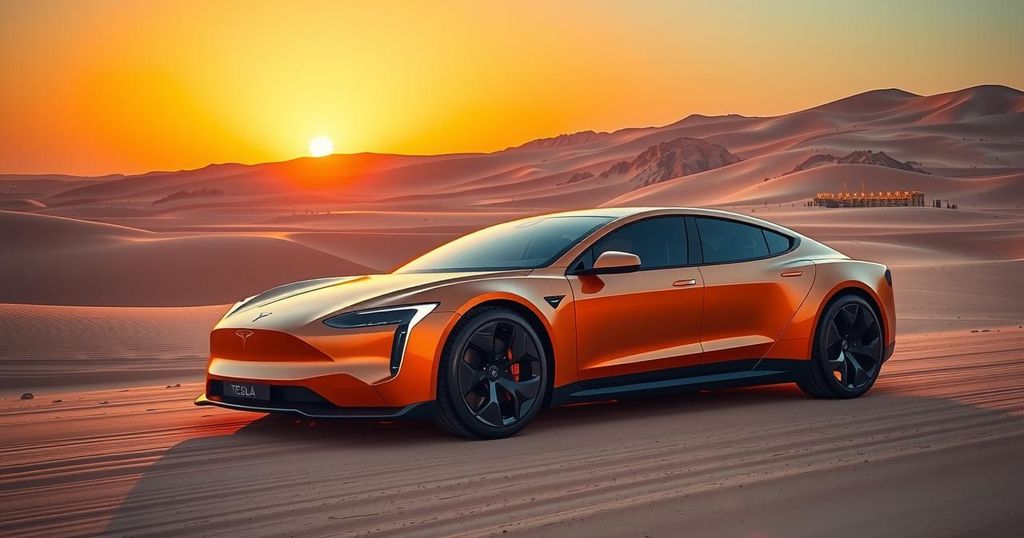Tesla Launches in Saudi Arabia: Navigating Forgiveness and Market Challenges

Tesla has launched its vehicles in Saudi Arabia, signaling a significant shift in automotive dynamics. Despite the launch’s potential, challenges such as limited charging infrastructure and competition from local and international brands remain. Elon Musk’s complicated relationship with Saudi officials further complicates matters, while Tesla’s recent sales figures have raised concerns about its future in the global market.
In a notable shift, Tesla has launched its electric vehicles, including Cybertrucks, in Saudi Arabia, the world’s second-largest oil producer. This milestone, marked by a grand opening of their showroom in Riyadh, represents a significant moment in both Tesla’s expansion and the broader energy transition. The event showcased a Cybertruck navigating desert sand on a massive screen, highlighting the paradox of oil-rich nations now embracing electric mobility.
Tesla’s founder, Elon Musk, has had a tumultuous relationship with the Saudi royal court, especially following his 2018 claim of “funding secured” for taking Tesla private, which led to a fallout with Saudi’s sovereign wealth fund chief, Yasir Al-Rumayyan. However, the two appeared friendly at a UFC event recently, suggesting reconciliation. Still, Tesla faces challenges in establishing a strong presence in Saudi Arabia’s automotive market, with only 101 EV charging stations in a nation striving for 30% electric vehicles by 2030.
The current number of EV sales in Saudi Arabia is dismal, with only 2,000 units sold in the entirety of 2024. In contrast, Tesla’s California factory alone produces that many vehicles daily. Further complicating matters is competition from Lucid Motors, backed by the Saudi Public Investment Fund, and Chinese companies like BYD and Zeekr, which present less divisive alternatives to Tesla in the region.
Moreover, Tesla is experiencing financial difficulties, marked by a 13% drop in global sales in the first quarter, its worst in almost three years. This follows a significant loss in market value of around $400 billion since the previous U.S. elections, with consumer backlash against Musk’s political affiliations noted as a factor.
Musk’s absence at the Riyadh launch raised eyebrows among fans, who expressed disappointment. Despite this, his influence remains significant in a country transitioning from oil dependency to electric vehicles. Tesla symbolizes this change but faces numerous hurdles in achieving the Vision 2030 initiative and establishing itself as an automotive leader in the region, making the journey ahead fraught with challenges.
As the venture progresses, successful integration into the Saudi automotive market will require expanding charging infrastructure and overcoming fierce competition, reinforcing the vital need for a comprehensive strategic approach to succeed in this evolving landscape.
Tesla’s introduction in Saudi Arabia marks a critical step in the global transition to electric vehicles, despite the challenges faced. Elon Musk’s complex history with the Saudi royal family, combined with the country’s limited infrastructure for EVs, poses significant hurdles. With only a small number of EVs sold and increasing competition, Tesla must navigate these obstacles effectively to fulfill its potential in this key market. The overall landscape highlights the transitional phase of both Tesla and Saudi Arabia, with a long road ahead for achieving broader EV goals.
Original Source: www.westernstandard.news





